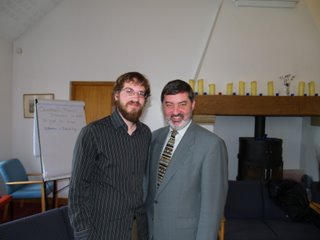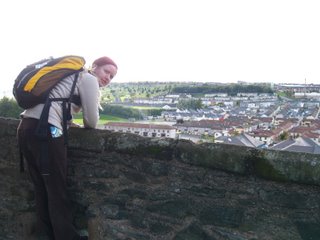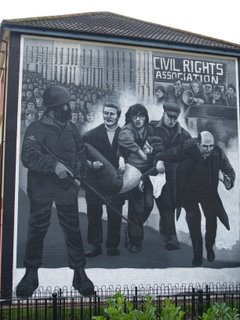For the weekend Niki and I are separated by sea and country. Niki is in Birmingham, England attending a conference on Religious Rights and Wrongs in Contemporary Conflict, and I am in Ballycastle, Northern Ireland teaching people how to play Settlers. As we speak there are three Northern Irelanders playing a game of Settlers on their own. Before we came to Northern Ireland I don't know if anyone had even heard of the game.
As far as an update is concerned. Last weekend Niki and I stayed in Belfast mee'n Corrymeela friends and ge'n to know the ci'y a wee bit be'er. This past week I was hos'n and facilita'n a youth group taking a class in religious studies. Their sessions were fabulous and as a group they were good craic.
This weekend I'm on housekeeping and after Monday Niki and I are off until Friday. It seems to me that Halloween is a bigger event here than in Canada. At least in Ballycastle there is festivities all weekend right up until Tuesday.
Friday, October 27, 2006
Thursday, October 19, 2006
Inter-Faith forum at Queen's University
Yesterday I along with two other volunteers had the opportunity to go to Belfast for a meeting on world religions in religious education. One of the most interesting speakers at the forum was a father who shared how Bahi children experienced both Catholic and Protestant schooling in Northern Ireland. The question this man left us with was how can schools accomodate children of other religions in a relational way. There was a book launch at the forum as well, the books are meant to be a resource for teaching world religions. Snapshots of different religions are presented throughout the book showing local faces and interpretations of their faith.
Saturday, October 14, 2006
Connecting with Vic Thiessen
This past weekend Niki and I shared a traditional Ulster Fry at Corrymeela with Vic Thiessen, Director of the London Mennonite Center. It is nice to connect with another Mennonite on the other side of the world. We played the Mennonite game and talked about our lives here and in Canada. The website for the London Mennonite Center is www.menno.org.uk/.
Lord John Alderdice speaks to group at Corrymeela
 This past Saturday morning I got up early during my off time to attend a session led by Lord John Alderdice. He spoke elequently on his experiences and what he has learned from those experiences. John touched on the role of religion in Northern Ireland challenging the religious communities to be more concerned about being prophetic unto its own community and less concerned about presenting its own troubles to the public. John emphasized in his stories the importance of providing hope, respect and a space to speak and to listen.
This past Saturday morning I got up early during my off time to attend a session led by Lord John Alderdice. He spoke elequently on his experiences and what he has learned from those experiences. John touched on the role of religion in Northern Ireland challenging the religious communities to be more concerned about being prophetic unto its own community and less concerned about presenting its own troubles to the public. John emphasized in his stories the importance of providing hope, respect and a space to speak and to listen.Above is a photo of myself and Lord John Alderdice at Corrymeela.
If you would like to learn more about Lord Alderdice here is a link: www.independentmonitoringcommission.org/cv_01.cfm
Wednesday, October 11, 2006
What do we do at Corrymeela?
This question of what we do at Corrymeela is very difficult to answer for many of us here, but I will try very hard to describe our work simply for the benefit of those who have been wondering.
There are four main areas of work that we are scheduled for: 1) Working with a group 2) Kitchen 3) Housekeeping 4) Resource.
The type of work that we do the most of and is most difficult to describe is working with groups. I'll divide this into tasks we need to do and what is flexible.
1) tasks we need to do: We need to prepare the residential space for a group by turning on the heating/lights, tidying, making a welcome poster, getting a coal fire ready to light if it is cold out, preparing a tea/coffee/juice and buscuit/sandwich trolley and generally create a welcoming atmosphere before the groups arrive. When the groups arrive we sit in with them during the cover speach about health and safety at Corrymeela and lead the group in some ice-breaker activities such as silly songs or games. After this there may be a session which will vary depending on the group and may be led by us, one of Corrymeela's staff or the group's facilitator. These times are usually the most interesting times for us. At 9:00pm everyone is welcome to worship in the Croi (meaning "heart" and is a building for worship, sessions or indoor activities), and following this there may be a session or free time. A lot of our work here is simply making someone a cup of tea and having a conversation with them. Around 10:30pm we will serve hot chocolate and buttered toast for "supper." Basically our schedule is dependent on the group's schedule and sometimes we are asked to lead, participate or if we are not needed or it is a private session we will be allowed an hour or two of down time. In the mornings we prepare breakfast, which always consists of cereal, toast, orange juice, sometimes porridge and of course tea or coffee. Worship in the morning is at 9:15 except Sundays where worship is only at 12:30 in the morning; worship is led by volunteers/staff/community members/group facilitators who sign up for worship. We will set the tables for lunch and dinner (or "tea" if it involves meat and potatoes), get the food in an electric trolley (if we are working in a residential space that is not where the food is cooked) and serve the food to guests. If we are scheduled for lock up we lock up the site at 12:00pm. Volunteers are off at 12:00 unless the fire alarm goes off in which we have to evacuate the building etc. If a group goes to bed before 12:00 we may be off then as well. 2) what is flexible: The in-between meal times and worship times is flexible; we may be taking a group of kids down to the beach, taking a tour of the Northern Coast with an adult group, listening to powerful political leaders from Northern Ireland or elsewhere and the list here is could go on and on, hence what we do is so hard to explain because we don't have much of a set routine. When the group leaves we do a verbal evaluation of how the week went.
Kitchen is more structured and usually considered a break from working with groups. We start at 9:30 work until about 10:30 when we take a 15-30 minute coffee break, then we work until lunch which is usually around 1:00. We then have our lunch and afterwards we just wash up, put the leftovers in the cold room and sweep and mop the floor. We get a break until about 5:15 when we do last minute prep work for Dinner and after Dinner we clean up and enjoy an evening off.
Housekeeping is from 10:00 in the morning until 3:00pm with a coffee break and a one hour lunch break. I haven't done this yet, but from what I understand it involves sweeping, mopping, cleaning windows, laundry etc. Housekeeping and Kitchen volunteers during the week decide and organize between them who does reception from 7-9 each day.
Resource is basically a float job and if there is a lack of groups on site there will be more volunteers on resource. This week I've worked an average of about 4 hours a day helping out on reception, kitchen, recreation store organization and preparing information packages to be sent out.
Groups are here from Tuesday to Friday or Friday to Sunday, Monday is a meeting day. Meetings involve a program co-ordination meeting, resource meeting (where we spend an hour organizing our resource area -- my area is the Croi, Niki's area is the playrooms), Coventry meeting (Coventry is where we live -- so we discuss the nitty gritty of living together as a community), and all site meeting. After that we have one of three things for 2 hours: training, reflections, community activity. Dinner is prepared by one of us and is a community meal, at 7:00 is what we call "super sevens" which is an opportunity to learn from all sorts of people from Northern Ireland. Sometimes this year groups have come on Monday already in which case we would start work after our "super sevens," but Monday nights have traditionally been down time for volunteers.
Our schedule involves roughly 6 days off a month, but this is not usually evenly spaced. During our year here we get two weeks off at Christmas, one week off before Christmas, one week off after Christmas and two weeks off during July and August which apparently is a whole new "system." We also get one week where we may work or get training from an organization of our choosing in Europe. Niki is hoping to go to Bethlehem and I'm not sure yet where I want to go.
That's a very simple outline of what we are currently doing. Basically, we are training to be experts in hospitality.
There are four main areas of work that we are scheduled for: 1) Working with a group 2) Kitchen 3) Housekeeping 4) Resource.
The type of work that we do the most of and is most difficult to describe is working with groups. I'll divide this into tasks we need to do and what is flexible.
1) tasks we need to do: We need to prepare the residential space for a group by turning on the heating/lights, tidying, making a welcome poster, getting a coal fire ready to light if it is cold out, preparing a tea/coffee/juice and buscuit/sandwich trolley and generally create a welcoming atmosphere before the groups arrive. When the groups arrive we sit in with them during the cover speach about health and safety at Corrymeela and lead the group in some ice-breaker activities such as silly songs or games. After this there may be a session which will vary depending on the group and may be led by us, one of Corrymeela's staff or the group's facilitator. These times are usually the most interesting times for us. At 9:00pm everyone is welcome to worship in the Croi (meaning "heart" and is a building for worship, sessions or indoor activities), and following this there may be a session or free time. A lot of our work here is simply making someone a cup of tea and having a conversation with them. Around 10:30pm we will serve hot chocolate and buttered toast for "supper." Basically our schedule is dependent on the group's schedule and sometimes we are asked to lead, participate or if we are not needed or it is a private session we will be allowed an hour or two of down time. In the mornings we prepare breakfast, which always consists of cereal, toast, orange juice, sometimes porridge and of course tea or coffee. Worship in the morning is at 9:15 except Sundays where worship is only at 12:30 in the morning; worship is led by volunteers/staff/community members/group facilitators who sign up for worship. We will set the tables for lunch and dinner (or "tea" if it involves meat and potatoes), get the food in an electric trolley (if we are working in a residential space that is not where the food is cooked) and serve the food to guests. If we are scheduled for lock up we lock up the site at 12:00pm. Volunteers are off at 12:00 unless the fire alarm goes off in which we have to evacuate the building etc. If a group goes to bed before 12:00 we may be off then as well. 2) what is flexible: The in-between meal times and worship times is flexible; we may be taking a group of kids down to the beach, taking a tour of the Northern Coast with an adult group, listening to powerful political leaders from Northern Ireland or elsewhere and the list here is could go on and on, hence what we do is so hard to explain because we don't have much of a set routine. When the group leaves we do a verbal evaluation of how the week went.
Kitchen is more structured and usually considered a break from working with groups. We start at 9:30 work until about 10:30 when we take a 15-30 minute coffee break, then we work until lunch which is usually around 1:00. We then have our lunch and afterwards we just wash up, put the leftovers in the cold room and sweep and mop the floor. We get a break until about 5:15 when we do last minute prep work for Dinner and after Dinner we clean up and enjoy an evening off.
Housekeeping is from 10:00 in the morning until 3:00pm with a coffee break and a one hour lunch break. I haven't done this yet, but from what I understand it involves sweeping, mopping, cleaning windows, laundry etc. Housekeeping and Kitchen volunteers during the week decide and organize between them who does reception from 7-9 each day.
Resource is basically a float job and if there is a lack of groups on site there will be more volunteers on resource. This week I've worked an average of about 4 hours a day helping out on reception, kitchen, recreation store organization and preparing information packages to be sent out.
Groups are here from Tuesday to Friday or Friday to Sunday, Monday is a meeting day. Meetings involve a program co-ordination meeting, resource meeting (where we spend an hour organizing our resource area -- my area is the Croi, Niki's area is the playrooms), Coventry meeting (Coventry is where we live -- so we discuss the nitty gritty of living together as a community), and all site meeting. After that we have one of three things for 2 hours: training, reflections, community activity. Dinner is prepared by one of us and is a community meal, at 7:00 is what we call "super sevens" which is an opportunity to learn from all sorts of people from Northern Ireland. Sometimes this year groups have come on Monday already in which case we would start work after our "super sevens," but Monday nights have traditionally been down time for volunteers.
Our schedule involves roughly 6 days off a month, but this is not usually evenly spaced. During our year here we get two weeks off at Christmas, one week off before Christmas, one week off after Christmas and two weeks off during July and August which apparently is a whole new "system." We also get one week where we may work or get training from an organization of our choosing in Europe. Niki is hoping to go to Bethlehem and I'm not sure yet where I want to go.
That's a very simple outline of what we are currently doing. Basically, we are training to be experts in hospitality.
Tuesday, October 10, 2006
religious conflict?
George raised the question of how much religion plays a part in the conflict. So far I have the impression that religion plays very little role in the conflict. I asked one of the volunteers from Belfast if religion has anything to do with the conflict and she laughed and said no. Basically one can be a Catholic or a Protestant without having a faith or going to church, it just depends which side of the political conflict one is born into. People here refer to the Catholic/Protestant conflict but it is best not to see this as meaning people here are fighting primarily over religious issues.
Monday, October 09, 2006
Derry


A highlight last week was when Niki and I had the opportunity to get a wee tour of Derry. With our group we walked the streets where "bloody Sunday" occurred and visited the memorial museum there. We saw the murals and walked the wall of the inner city on a guided tour.
At the top is a picture of Niki looking from the wall at Derry; below that is a picture of a mural depicting Bloody Sunday.
Subscribe to:
Comments (Atom)